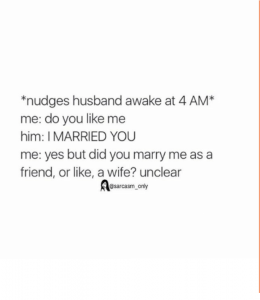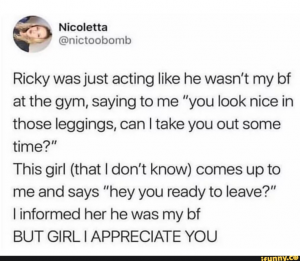Uncertainty
ncertainty is a common space we find ourselves in often. Uncertain we heard a noise, uncertain if our attire is appropriate for a function, uncertain of the best meal to get at a restaurant, uncertain if the text we sent will be received well, etc.

In my opinion, the only exaggeration in the above meme is the person asked the question out loud instead of keeping it to themselves as most of us tend to do when faced with uncertainty. We are uncertain A LOT and yet often only voice the most benign of our uncertainties, e.g., “Did you hear that noise?”— we keep our most challenging bouts with uncertainty to ourselves, even when those situations come at a much higher cost.
As bystanders, uncertainty can be paralyzing. When we think about issues of sexual assault, domestic violence, harassment, bullying—those issues are bad, high risk. They conjure up images of movie plots, heartbreaking novels, news stories and personal stories. They are extreme in our minds—as they are in real life. However, in real life, as bystanders, we rarely witness every moment of escalation up to and including its most brutal pieces. So often we are in the position of seeing just an instance, a moment and attempting to make the judgment that THIS behavior, THIS moment, could lead to THAT image in our minds, and we feel…uncertain. Then add in any other additional information. It’s our friend doing it and MY friend would never…it’s in a public place and SURELY they would never…there is no way THIS is what I think it is.
I could attempt to wax poetically about all of us being in the same boat of uncertainty together, hoping someone else does something— and declaring, “SO WHY NOT YOU?” And end this blog on an impressive one-liner that will motivate you to overcome uncertainty the next time you experience it. However, I am uncertain that would work and even more uncertain of my own poetic abilities given the rather harsh review of my 7th grade teacher gave my poem about the 8thwonder of the world: BBMak (best remembered by this gem: https://youtu.be/l95MMbls0GQ), but I digress.
Instead, I’ll ask you to consider some possible solutions. What if you took a second look to see if there is additional information you can learn? Body language, tone… does one person seem like they would rather be anywhere else?
What if we normalized just checking in? Asking the question “are you okay?” or “I noticed this, and it concerned me, can you tell me more about what was happening?”
What if we just caused a distraction? For example, showed a funny meme you saw in a blog about how uncertain we all are? Or a YouTube video that took you back to 1999?
What if we involved other people. What if we ask them, “do you notice this? Does it seem weird/concerning to you?”
What if we connected to our reason for WHY we should find some way to respond? Considered the possibility that we don’t have to definitively know that something is SOMETHING in order to communicate that we are people who look out for one another?

Maybe, just maybe, we can reconceptualize ‘certainty’. What if it is not absolute certainty of the potential risk of the situation that propels us to act, but the certainty of who we want to be in the world? Certainty of the example we want to model for those around us? Certainty of the values that we hold closely? Certainty that we watch out for each other?
I cannot change your uncertainty, CERTAINLY not in one blog post (see what I did there?) While not particularly profound, what I do want to leave you with is this: Your uncertainty is not a moral failing and certainty of an outcome is not a prerequisite for action. Both individually and collectively, change within our culture happens NOT because people are certain of outcomes but because they are certain of who we SHOULD be and make their choices accordingly. Consider for yourself what values and norms you want to communicate and make decisions accordingly.





